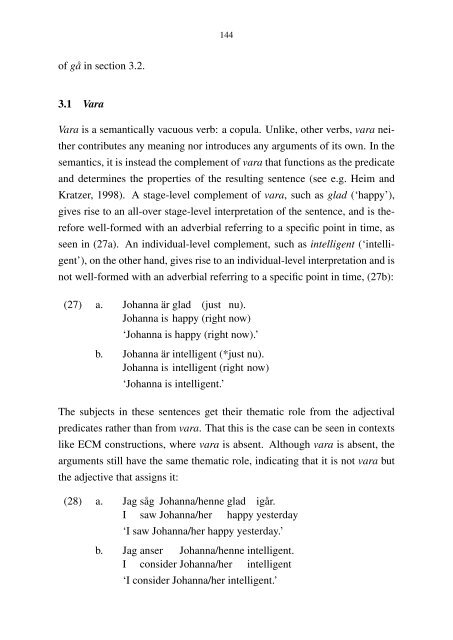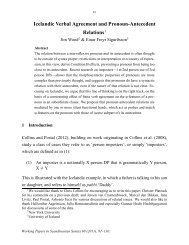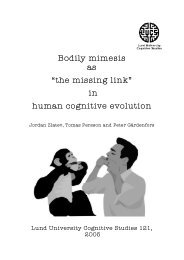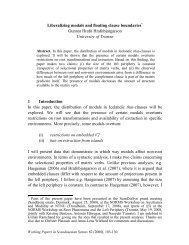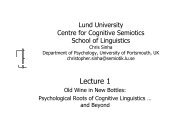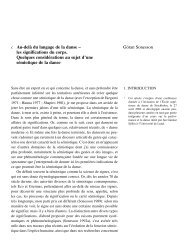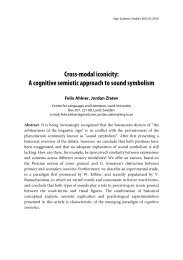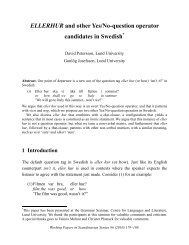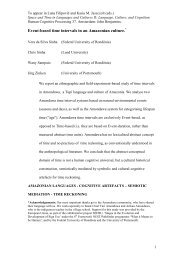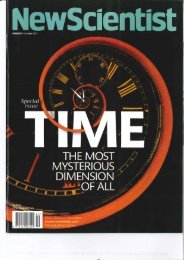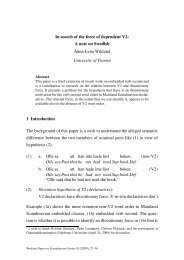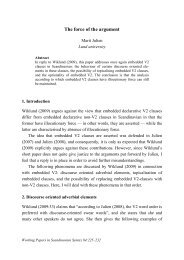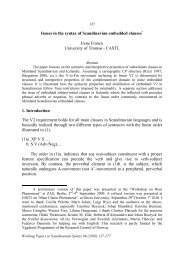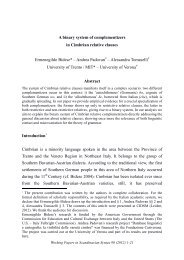Eva Klingvall On non-copula Tough Constructions in Swedish (PDF ...
Eva Klingvall On non-copula Tough Constructions in Swedish (PDF ...
Eva Klingvall On non-copula Tough Constructions in Swedish (PDF ...
You also want an ePaper? Increase the reach of your titles
YUMPU automatically turns print PDFs into web optimized ePapers that Google loves.
144of gå <strong>in</strong> section 3.2.3.1 VaraVara is a semantically vacuous verb: a <strong>copula</strong>. Unlike, other verbs, vara neithercontributes any mean<strong>in</strong>g nor <strong>in</strong>troduces any arguments of its own. In thesemantics, it is <strong>in</strong>stead the complement of vara that functions as the predicateand determ<strong>in</strong>es the properties of the result<strong>in</strong>g sentence (see e.g. Heim andKratzer, 1998). A stage-level complement of vara, such as glad (‘happy’),gives rise to an all-over stage-level <strong>in</strong>terpretation of the sentence, and is thereforewell-formed with an adverbial referr<strong>in</strong>g to a specific po<strong>in</strong>t <strong>in</strong> time, asseen <strong>in</strong> (27a). An <strong>in</strong>dividual-level complement, such as <strong>in</strong>telligent (‘<strong>in</strong>telligent’),on the other hand, gives rise to an <strong>in</strong>dividual-level <strong>in</strong>terpretation and isnot well-formed with an adverbial referr<strong>in</strong>g to a specific po<strong>in</strong>t <strong>in</strong> time, (27b):(27) a. Johanna är glad (just nu).Johanna is happy (right now)‘Johanna is happy (right now).’b. Johanna är <strong>in</strong>telligent (*just nu).Johanna is <strong>in</strong>telligent (right now)‘Johanna is <strong>in</strong>telligent.’The subjects <strong>in</strong> these sentences get their thematic role from the adjectivalpredicates rather than from vara. That this is the case can be seen <strong>in</strong> contextslike ECM constructions, where vara is absent. Although vara is absent, thearguments still have the same thematic role, <strong>in</strong>dicat<strong>in</strong>g that it is not vara butthe adjective that assigns it:(28) a. JagIb. JagIsåg Johanna/henne glad igår.saw Johanna/her happy yesterday‘I saw Johanna/her happy yesterday.’anser Johanna/henne <strong>in</strong>telligent.consider Johanna/her <strong>in</strong>telligent‘I consider Johanna/her <strong>in</strong>telligent.’


